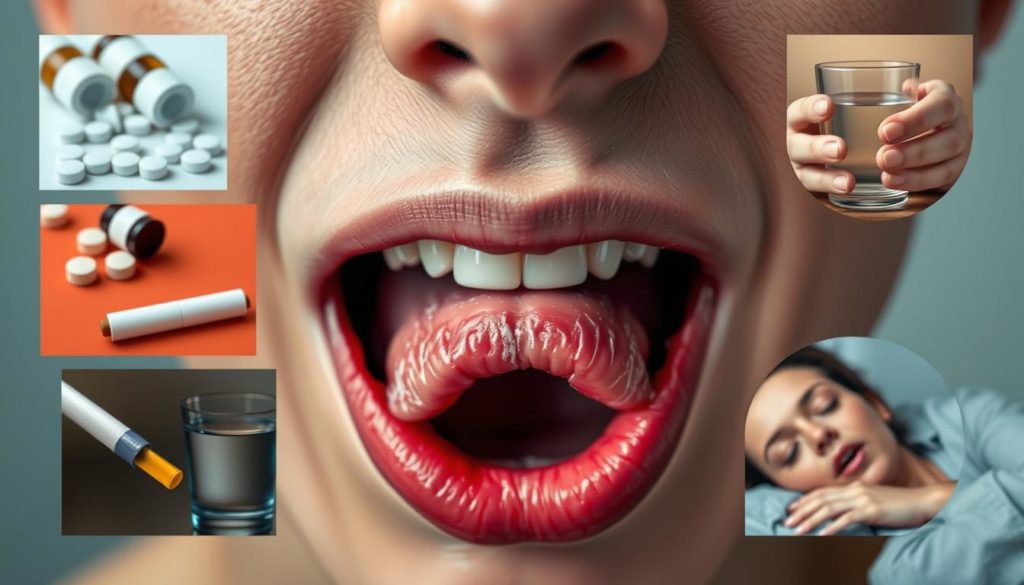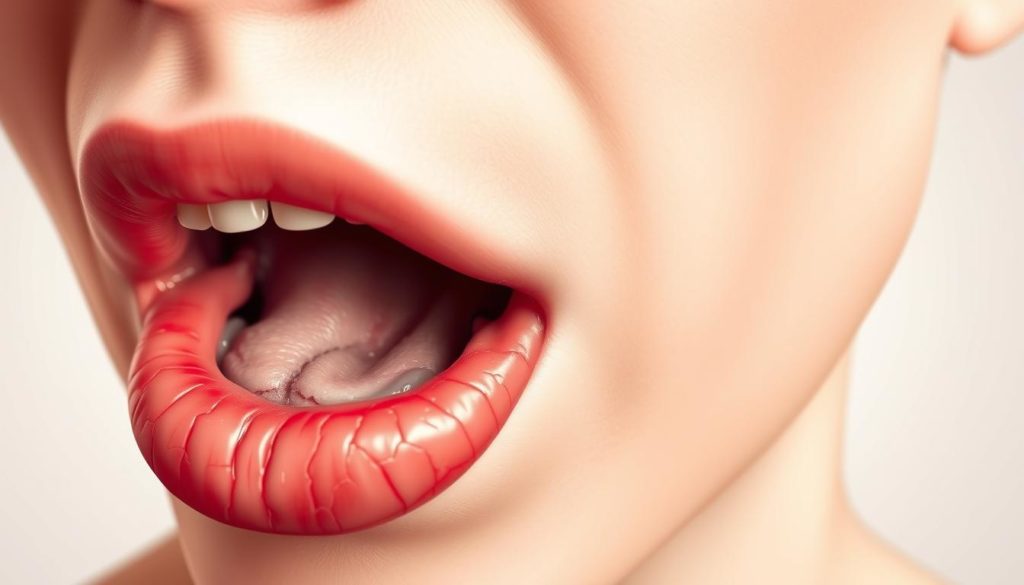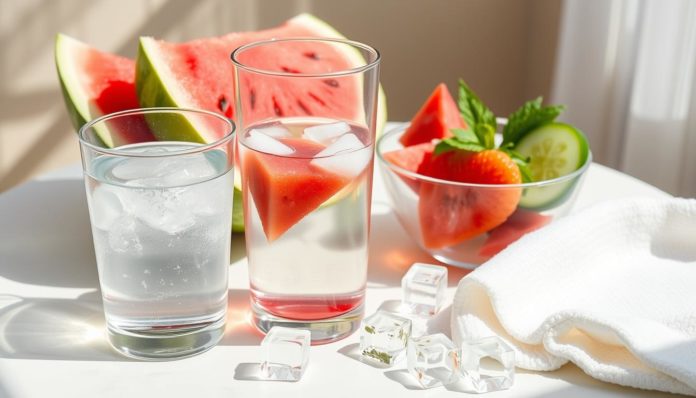Did you know nearly 22% of Americans suffer from dry mouth, or xerostomia? This common issue affects comfort and health in daily life. Dry mouth, while seeming minor, can cause big problems. These include trouble swallowing, dental decay, and infections.
It’s vital to know the top treatments for dry mouth. We’ll cover everything from natural remedies to over-the-counter products. Plus, we’ll look into prescription meds and lifestyle tweaks for relief.
Get ready to dive into a wide range of treatment options. These tips will help you improve your comfort and oral health.
Understanding the Causes of Dry Mouth
Dry mouth, or xerostomia, causes discomfort due to a lack of moisture. It arises from many factors, affecting saliva production.

Medications and Their Side Effects
Many medicines are a key reason for dry mouth. Various prescription and over-the-counter drugs lessen saliva as a side effect. Among them, antidepressants, antihistamines, and diuretics are frequent. The American Dental Association has identified over 400 medications related to dry mouth. It’s crucial to talk about these effects with healthcare providers.
Medical Conditions Leading to Dry Mouth
Some health issues can cause dry mouth too. For example, diabetes can raise blood sugar levels, impacting saliva. Also, autoimmune diseases like Sjögren’s syndrome hit moisture-producing glands hard. This leads to severe dry mouth. Health groups link these conditions with reduced saliva, highlighting the importance of careful health management.
Lifestyle Factors Contributing to Dry Mouth
Your daily choices also affect dry mouth. Smoking and drinking alcohol can cut down your saliva significantly. Not drinking enough water or heavy exercise worsens it. Studies on lifestyle confirm these effects, advising moderation and staying hydrated to avoid dry mouth.
Recognizing the Symptoms of Dry Mouth
It’s important to catch the symptoms of dry mouth early. This helps keep your mouth healthy. You might notice your mouth feels sticky or dry all the time.
Understanding these signs prevents worse issues.
Common Signs to Watch For
Look out for these dry mouth symptoms:
- Sticky, dry feeling in the mouth
- Frequent thirst
- Sores or split skin at the corners of the mouth
- Cracked lips
- Dry, rough tongue
- Bad breath
- Difficulty in chewing, swallowing, or speaking

When to Seek Medical Advice
Spotting dry mouth signs early is key. But knowing when to get help is just as crucial. If your dry mouth doesn’t go away, it could mean bigger health problems.
Seeing continuous dry mouth symptoms with other oral health signs means it’s time for expert advice. Acting fast with a healthcare provider’s help stops more serious problems.
Natural Remedies for Dry Mouth
Looking into natural ways to ease dry mouth can bring gentle relief. This condition can be quite uncomfortable.
Herbal Solutions
For centuries, herbs have been curing various health issues. Dry mouth is one of them. There are a few good herbal choices:
- Ginger: Known for boosting saliva, ginger is a great help.
- Green Tea: Packed with antioxidants, green tea hydrates your mouth and promotes dental health.
- Aloe Vera: Famous for its calming effects, aloe vera also helps keep the mouth moist.
Hydration and Diet Tips
Staying hydrated and eating right are key in handling dry mouth. Here are some effective steps:
- Drink a lot of water to stay hydrated.
- Eat foods that are moist and make you chew, like apples and celery, to get saliva going.
- Steer clear of caffeine and alcohol since they can make your mouth drier.
Adding these natural remedies for dry mouth into your life can really boost your comfort and dental health.
Over-the-Counter Dry Mouth Products
There are many over-the-counter products for those with dry mouth. They come in different types. It’s important to know these to find the best one for you. This knowledge can help prevent dry mouth.
Types of Products Available
There’s a big variety of products for dry mouth relief. Each type has a unique purpose. Here are some common options:
- Saliva Substitutes: These replace your natural saliva and keep your mouth moist.
- Oral Rinses: Special mouthwashes that add moisture and help with dryness.
- Moisturizing Gels: Thicker than rinses, these give direct moisture to your mouth.
How to Choose the Best Product for You
Choosing the right product for dry mouth prevention needs some thought. Here’s what to consider:
- Ingredients: Look for natural options and stay away from alcohol-based ones to avoid more dryness.
- Ease of Use: Think about how easy it will be to use the product every day.
- Symptom Severity: Pick products based on how severe your dry mouth is.
- Professional Recommendations: Always ask dental health experts for their advice and product suggestions.
Thinking about these tips can lead you to the best over-the-counter product. This way, you can handle your dry mouth symptoms better.
Prescription Treatments for Severe Dry Mouth
If you have severe dry mouth, you’ll likely need to see a healthcare provider. They can prescribe medical treatment for dry mouth. These treatments can increase saliva or tackle the main cause.
Medications Your Doctor Might Recommend
If you’re dealing with this, you might get prescription salivary stimulants like pilocarpine or cevimeline. They help your salivary glands produce more moisture. This way, you get the relief you need. Here are some options:
- Pilocarpine (Salagen)
- Cevimeline (Evoxac)
- Acupuncture
Sometimes, other treatments may be needed for severe dry mouth. If it’s caused by another condition, like Sjögren’s syndrome, treating that can help too.
| Medication | Function | Benefits |
|---|---|---|
| Pilocarpine | Stimulates saliva production | Effective for severe dry mouth from various causes |
| Cevimeline | Enhances saliva gland function | Particularly useful for Sjögren’s syndrome patients |
Dry Mouth Treatment Options and Their Effectiveness
Millions of Americans suffer from dry mouth, or xerostomia. It causes discomfort and can disrupt daily life. There are many treatments available, each with its own success rate. Knowing which method works best is important for improving oral health and finding relief.
For quick dry mouth relief, many turn to saliva substitutes and stimulants. These come as sprays, gels, and lozenges. They provide moisture fast. Studies find these products helpful for short-term relief. Considering various options is essential to weigh their pros and cons:
| Treatment Option | Benefits | Limitations |
|---|---|---|
| Saliva Substitutes | Instant moisture, easy to use | Temporary relief, needs frequent reapplication |
| Saliva Stimulants | Encourages natural saliva production | May not work for everyone, overuse can cause side effects |
| Medicated Rinses | Anti-inflammatory and moisturizing properties | Possible irritation, prescription required |
| Herbal Remedies | Natural, few side effects | Varied effectiveness, not widely studied |
Different treatments contribute to improving oral health. Experts often recommend using several methods for better results. Mixing temporary relief from saliva substitutes with long-lasting effects from stimulants might improve treatment. Personalized approaches usually give the best outcomes, as told by patients.
Finding the right balance for each person is crucial. A dentist can help create a plan that uses the best treatments available.
Oral Hygiene Practices to Alleviate Dry Mouth
Good oral hygiene is key to managing dry mouth well. By following a proper dental care plan, you can ease dry mouth symptoms. This also boosts your overall oral health.
Best Practices for Daily Care
To keep your mouth healthy and lessen dry mouth, use these daily dental care tips:
- Brush Twice Daily: Choose a soft-bristled toothbrush and fluoride toothpaste. Gently clean your teeth, gums, and tongue.
- Floss Regularly: Flossing gets rid of food bits and plaque between teeth, where brushes can’t go.
- Specialized Mouthwash: Think about using a mouthwash made for dry mouth. It helps keep your mouth moist and protected.
How Oral Hygiene Influences Dry Mouth
Regular oral hygiene can greatly reduce dry mouth symptoms. Keeping your mouth clean lowers infection and tooth decay risks. Both are common with dry mouth.
Research shows that a solid dental care routine can lessen dry mouth discomfort. It also improves your oral health overall.
Dietary Changes to Prevent Dry Mouth
Managing dry mouth well means changing what you eat. Adding some foods and cutting others can make a big difference. Knowing which foods keep the mouth wet and which make it dry is key for people with dry mouth.
Foods to Include
Add foods with a lot of water, like cucumbers, melons, and oranges. These help keep the mouth moist and offer vital vitamins. Also, eat fiber-rich foods like apples and carrots to make more saliva. Use sugar-free options like xylitol gum or lollipops to help without harming teeth.
Foods to Avoid
Avoid foods that can make dry mouth worse. Drinks with alcohol or caffeine and certain foods dry you out. Stay away from salty and processed snacks because they’re high in salt. Cutting down on spicy foods is also good, as they can make your mouth drier.
FAQ
What are some effective dry mouth treatments?
For dry mouth, try over-the-counter options like saliva substitutes and moisturizing gels. Natural remedies can also stimulate saliva production. Severe cases might need medications like pilocarpine or cevimeline.
What causes dry mouth?
Dry mouth can come from many sources, like certain medicines, medical issues, or lifestyle choices. Factors include smoking, drinking alcohol, and not drinking enough water.
What are the symptoms of dry mouth?
Common signs include a sticky feeling in the mouth and bad breath. Trouble swallowing and a dry tongue are also symptoms. If these issues don’t go away, see a doctor.
Are there natural remedies for dry mouth?
Yes, natural solutions like ginger and green tea can help dry mouth. Staying hydrated and eating moist foods are key. Foods that encourage saliva can also be good.
What over-the-counter products help with dry mouth?
Products like saliva substitutes and moisturizing gels can ease dry mouth. Oral rinses and special mouthwashes also help to keep the mouth moist.
When should I seek medical advice for dry mouth?
If you have ongoing issues like trouble swallowing or bad breath, get medical help. A professional can find the cause and suggest treatments.
How do lifestyle changes help in managing dry mouth?
Changing habits can make a big difference in managing dry mouth. Cut down on smoking and alcohol, stay hydrated, and eat foods that boost saliva.
What prescription treatments are available for severe dry mouth?
For tough cases, doctors may prescribe drugs like pilocarpine or cevimeline. These medications increase saliva production and help those with chronic dry mouth.
How does good oral hygiene help with dry mouth?
Keeping your mouth clean is crucial. Brush and floss regularly and use dry mouth mouthwash. These steps prevent infections and keep your mouth healthy.
What dietary changes can prevent dry mouth?
To fight dry mouth, eat saliva-promoting foods like fruits and veggies. Avoid dry snacks, caffeine, and acidic foods. This can keep saliva levels healthy.


